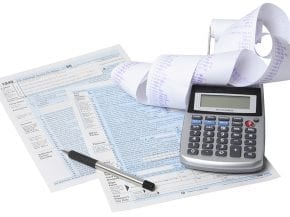- browse by category
- Audit Assistance
- Business and Taxes
- Celebrities in Tax Debt
- Cryptocurrency Taxes
- Economic News
- Foreign Banking
- Innocent Spouse
- IRS debt settlement
- IRS Headlines
- IRS Wage Garnishment
- Marriage & Divorce
- Payroll Tax
- Retirement
- Revenue Officers
- State Tax Headlines
- Stop IRS Debt
- Success Stories
- Tax and Politics
- Tax Attorney
- Tax Codes
- Tax Debt Help
- Tax Evasion
- Tax Levy
- Tax Lien
- Tax Payment Plans
- Tax Return Filing
- Tax Tips

After completing your taxes and waiting patiently for your refund, it feels like it’s finally all over. But not so fast. The best thing you can do now to set yourself up for an easier tax season next year is to keep relevant records, preferably in digital form. Not sure what to keep? Here are a few pointers on how to determine what’s tax treasure and what’s trash.
Potential Usefulness of Tax Records
A variety of documents are surely piled on your desk, or shoved in a folder in your kitchen. Go through each one and think of how it can possibly benefit you in the future. If it supports an item of income, deduction or credit shown on your tax return, hold on to it until the period of limitations for that tax return runs out. If it’s a receipt from charity you donated over a year ago, you can probably toss it, or scan it and archive. Also, documents may not be used for tax purposes, but perhaps your insurance company or creditor needs to see proof of income. Always think of the larger picture. When in doubt, make a digital copy and throw out the paper version.
Chance of An Audit
The IRS audited less than 1 % of all taxpayers in 2014, meaning you likely won’t be one of them. However, if you are one of the taxpayers who reports more than $10 million, or none at all, or filed an international return, chances are a bit higher. Instead of taking your chances, keep the records that the IRS would take a close look at, should you become one of the unlucky ones.
Correlating with the period of limitations, it’s best to keep records that will support the way in which you filed your taxes for as long as you can be audited. The period of limitations is the timeframe in which you can amend your return to claim a credit or refund. If you don’t, the IRS can assess additional tax.
The periods range from 3 to 7 years. You should keep all tax records 3 years from the date you filed the original return. Keep records for 7 years if you file a claim for a loss from securities or bad debt deduction. Keep tax records for 6 years if it supports 25% or more of the gross income shown on your return. And keep employment tax records for at least 4 years after the tax is paid.
Relation to Property
When it comes to property, hold on to them a bit longer. Keep these records until the period of limitations expires for the year in which you release the property. The records aid in figuring out depreciation, amortization, or depletion deduction, as well as calculating gain or loss when selling the property.
Tax Records and Your Future Tax Filing
For many people, filing their taxes means simply amended last year’s return. Digital tax records will become out of sight as soon as you scan them to a drive, so doing so won’t be a bad idea. Next year, you’ll just click through and punch numbers. Receipts, proof of income, and copies of filed tax returns can be invaluable for next year’s taxes.
General rule of thumb: always follow the rules of limitations, and keep anything that bears a slight chance of being valuable as a digital copy. Last but not least, shred the paper copy to avoid identify theft.
Leave Comments

Top Tax
secrets revealed
Sign up for our newsletter and be the first to find out when exciting IRS news happens. Yes, exciting. We're really into taxes.


